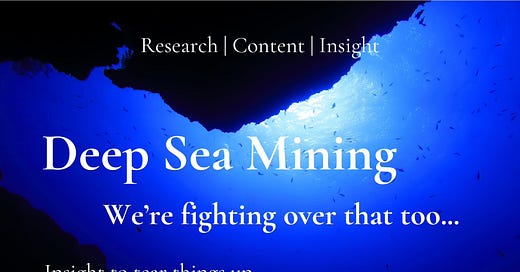It’s wildly expensive, but the potential of deep-sea mining is undeniable: vast untapped commercial potential to recover mineral resources is enormous. Sweetening the deal for mining companies is that operations are combined with the guilty-free out of sight/out of mind dynamic for people who love hi-tech kit, but don’t want to think too hard how its made. Beneath the waves, the ocean floor is the sort of abstraction that the average rich-world environmentalist reserves for Africa or outer Mongolia.
The Clarion-Clipperton Zone (CCZ) is an enormous patch of seabed some 500 miles southeast of Hawaii should be abstract enough to not infuriate the world. Then, on 25 April, Donald Trump told federal agencies to start preparing “commercial recovery permits” - essentially deep sea mining concessions – for the CCZ. Which, a careful reader will note, is flat in the middle of international waters.
The mining process is expensive as hell, but straight forward. Robots that, if you grew up mooning around the Mississippi Delta, look like a Captain Nemo’s souped up combine harvester crawl along the seabed scraping up nodules and send them back up to the surface for first stage processing for the sought after minerals, then dumping the rest back where it was found.
The boom in deep sea mining will likely do more for US than a hoped for a misty-eyed return of manufacturing. It isn’t so much that the mining companies must be companies must be American, the first in line is a Canadian mining company. It’s that Washington wants to control it.
Global outrage has ensued, starting with the UN, which has an agency it created in 1994 for just this sort of eventuality, the International Seabed Agency (ISA) and yes, that’s a thing too. China has, of course, condemned the zone. It does a lot of bankrolling of the UN’s ISA to A) look like a swell global citizens and B) “encourage" the ISA to ignore Beijing doing essentially the same thing in the South China Sea. France’s Ocean Ambassador (and that is a thing) said: “The abyss is not for sale.”
It really is hard to take people seriously when they say things like that. Still, the rest of the world (if not China) does have a point here: The US is trying is abandoning rules-based order while retaining the right to issue mining rights in international waters. Practically speaking, in a world dividing into rival blocks without an international order - it’s hard to see how this free-for-all doesn’t lead to conflict.
For its part, the ISA which under the UN claims “sole jurisdiction” over the CCZ, making the whole painful ordeal a question of enforcement. To paraphrase Stalin, How many divisions does the UN have? Well, without the US, not many.
Richard Murff is the founder of 4717 Insights. For more insight to tear things up, head to the 4717. Murff is the author of Haint Punch, Drunk as Lords, and the revised and updated Pothole of the Gods: Holy Wars, Proxy Wars & Fake News - coming soon..





